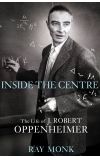
17 Dec 2012 03:32:38
The tension between Oppenheimer's two sides – his need to be at the centre of power versus his wish to retain his conscience – lie at the heart of Ray Monk's wonderful new biography. Monk takes as his starting point Isidor Rabi's assertion that Oppenheimer's problem was "identity": that he was "a man put together of many bright shining splinters", who "never got to be an integrated personality"… "You carried on a charade with him. He lived a charade."
Oppenheimer was ill at ease with his Jewish origins, and thanks to his father's huge wealth and his mother's overprotective instincts he had grown up in a luxurious apartment on New York's Riverside Drive, surrounded by Van Goghs and Picassos and shielded from reality. In his own words, he was an "unctuous, repulsively good little boy", unprepared "in any way for the fact that there are cruel and bitter things", and he was offered "no normal, healthy way to be a bastard". This wouldn't have mattered had his ambitions not taken him into the big, bad world.
Oppenheimer's intellectual brilliance was never in doubt. He switched from chemistry to physics at Harvard, and after a disastrous interlude at Cambridge he plunged into the world of quantum mechanics, soon establishing himself as a theoretical physicist respected by – if not quite on a par with – Paul Dirac, Werner Heisenberg and Niels Bohr. At Berkeley in the 1930s he built up a distinctively American school of physicists and made contributions to astrophysics that, Monk argues, would have won him the Nobel prize had he lived longer.
Then came the two events that would shape Oppenheimer's life. In the late 1930s he began to associate with communists, unaware that they were under surveillance, and Oppenheimer himself popped up on the FBI's radar. And in 1942 General Leslie Groves, the man tasked by Roosevelt with building an atomic bomb in America, chose him to be the scientific director of the Manhattan Project. At the specially created laboratory at Los Alamos, Oppenheimer revealed extraordinary gifts of leadership, nursing a huge team of scientific prima donnas with passion, tact and skill.
With the dropping of the bomb, Oppenheimer became America's most famous scientist, but he was appalled by the human suffering at Hiroshima and made confused attempts to avoid an atomic arms race, which put him increasingly at odds with the hawkish mood in Washington. When he told Harry Truman that he felt he had blood on his hands, the president warned his aides to keep this "cry-baby scientist" away from him. Matters came to a head when Oppenheimer initially opposed the building of the "Super", or hydrogen bomb. His many powerful enemies – notably Edward Teller, the scientific advocate of the H bomb, the US air force and the Washington power broker Lewis Strauss – finally struck at him in 1954, using as their main weapon FBI records of his contacts with communists. They failed to prove that Oppenheimer was a Soviet spy, but they destroyed his character. He retreated to Princeton, where he ran the Institute for Advanced Study, before dying of throat cancer in 1967.
Monk retells this great 20th-century tragedy magnificently, in measured English prose, not Time journalese. He brings off the set pieces, such as the Trinity test, but he also explores Oppenheimer the physicist with a thoroughness some readers may find arduous. He is, though, surprisingly lacking in low curiosity, declining to speculate, for example (as the scientific writer Jeremy Bernstein does), on whether Oppenheimer's much disliked wife, Kitty, was the first woman with whom he had a full sexual relationship.
Inside the Centre shows how the passage of time has shifted perspectives. The FBI's obsession with Soviet atomic spies is more understandable now that we know how many of them there were. Equally, the scientists were right to foresee that the US could never hold the "nuclear secret" and that nuclear weapons would usher in a new age of mutually assured destruction. And yet they were naive to think that one could deal with Stalin. As Truman's secretary of state Dean Acheson said, "How can you persuade a paranoid adversary to disarm 'by example'?"
Oppenheimer himself has become less heroic and more fallible over time – a man who betrayed friends to hang on to his special position and lied in tight situations (though it was his misfortune to have his every human failing recorded and picked over for decades by security men, journalists and historians). It was inevitable, in the hysterical climate of McCarthyism, that Oppenheimer would be edged out; but his special facility in making enemies, the casual arrogance with which he had humiliated the powerful, guaranteed their revenge should take such a horrible form. If all the "evil of the times" was wrapped up in this judicial travesty, so were Oppenheimer's deep flaws of character.

